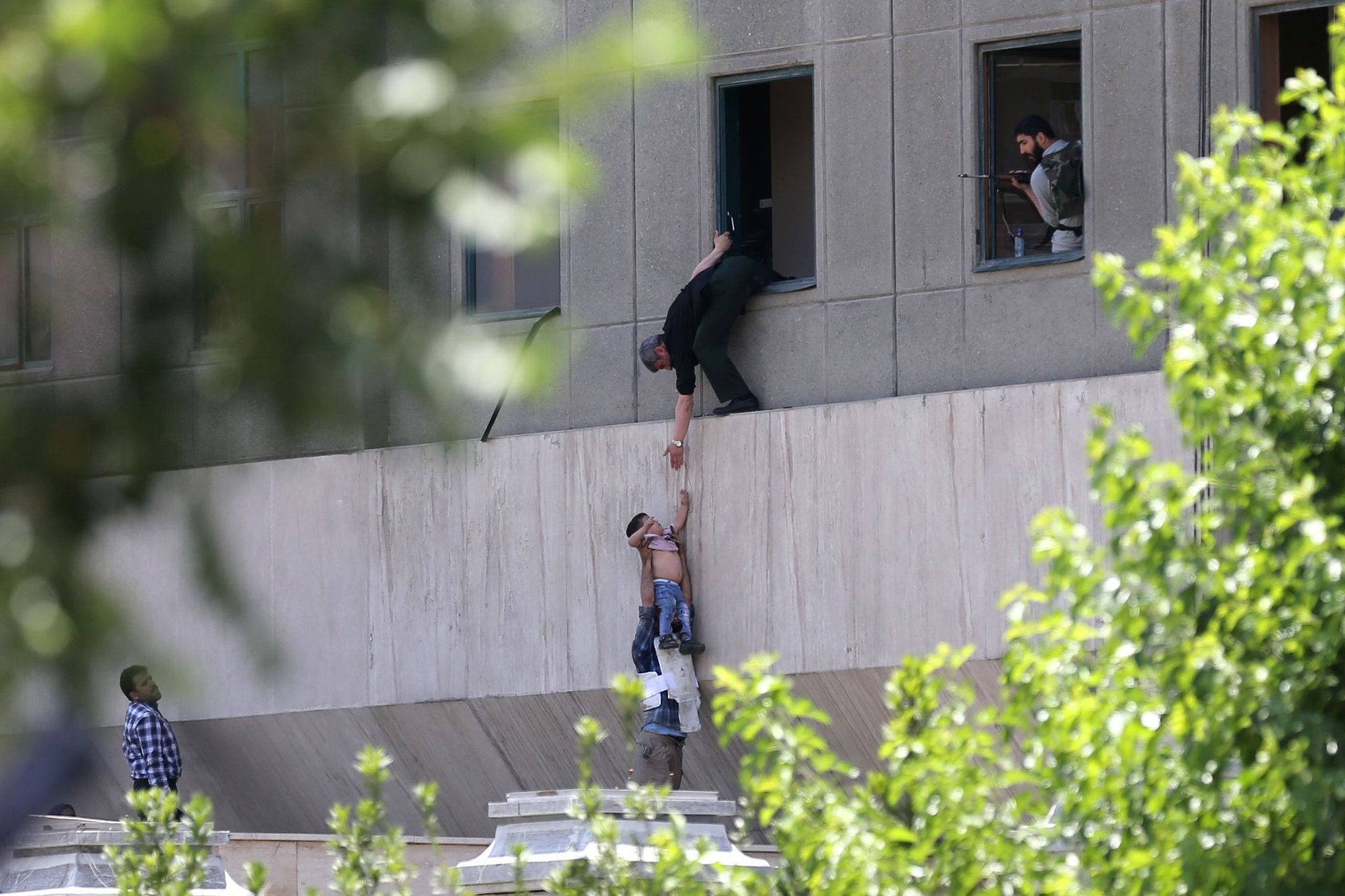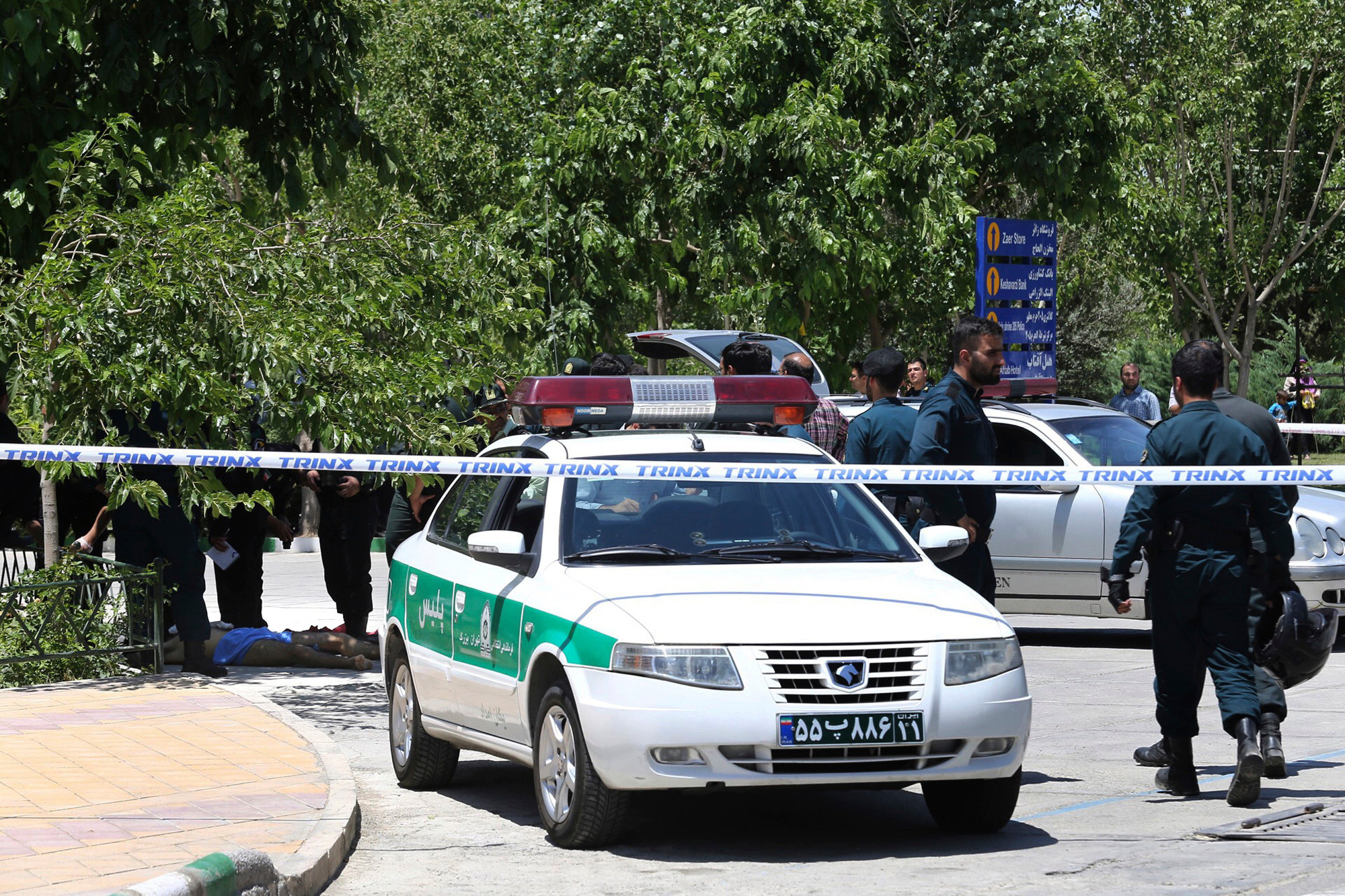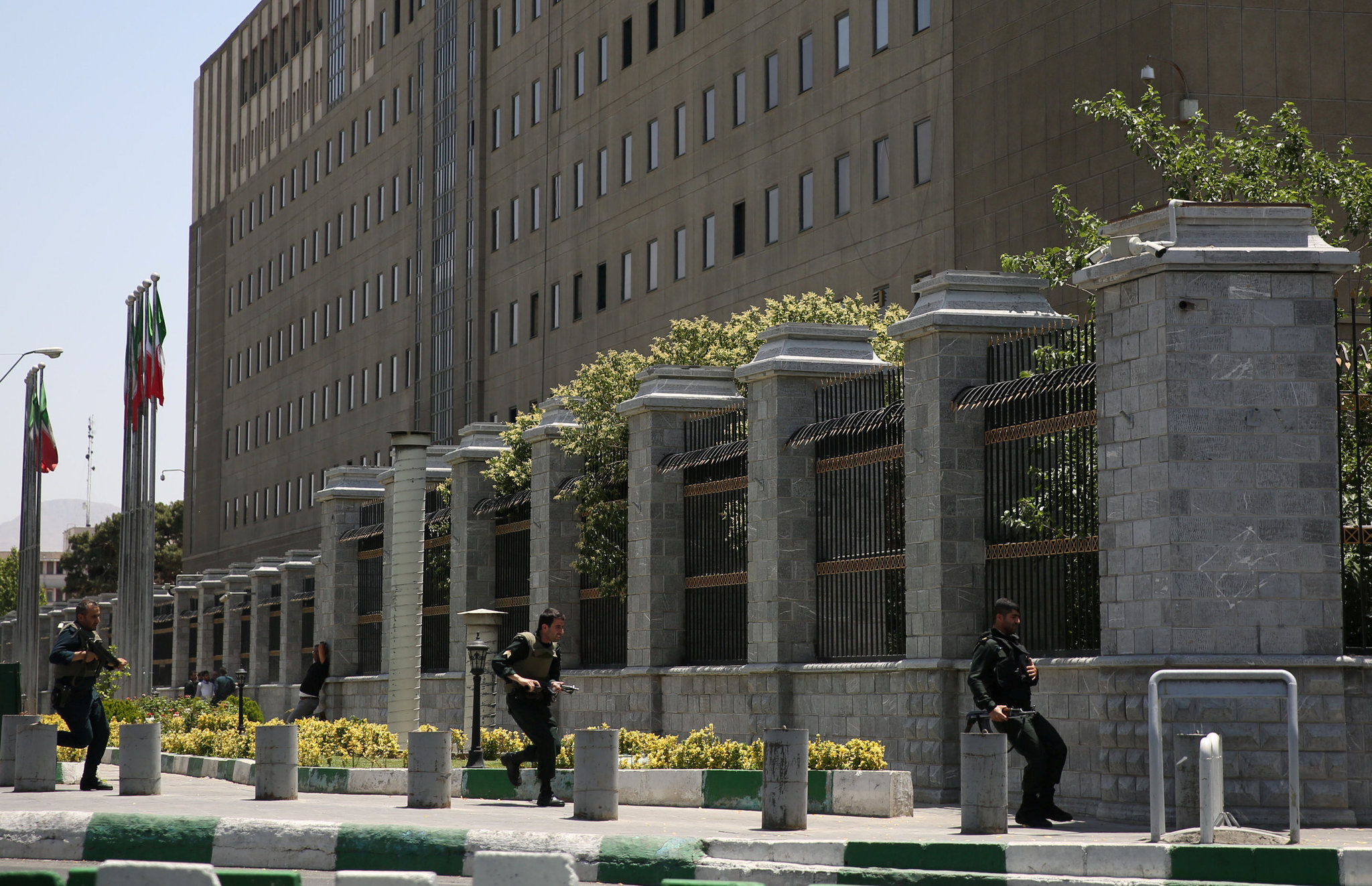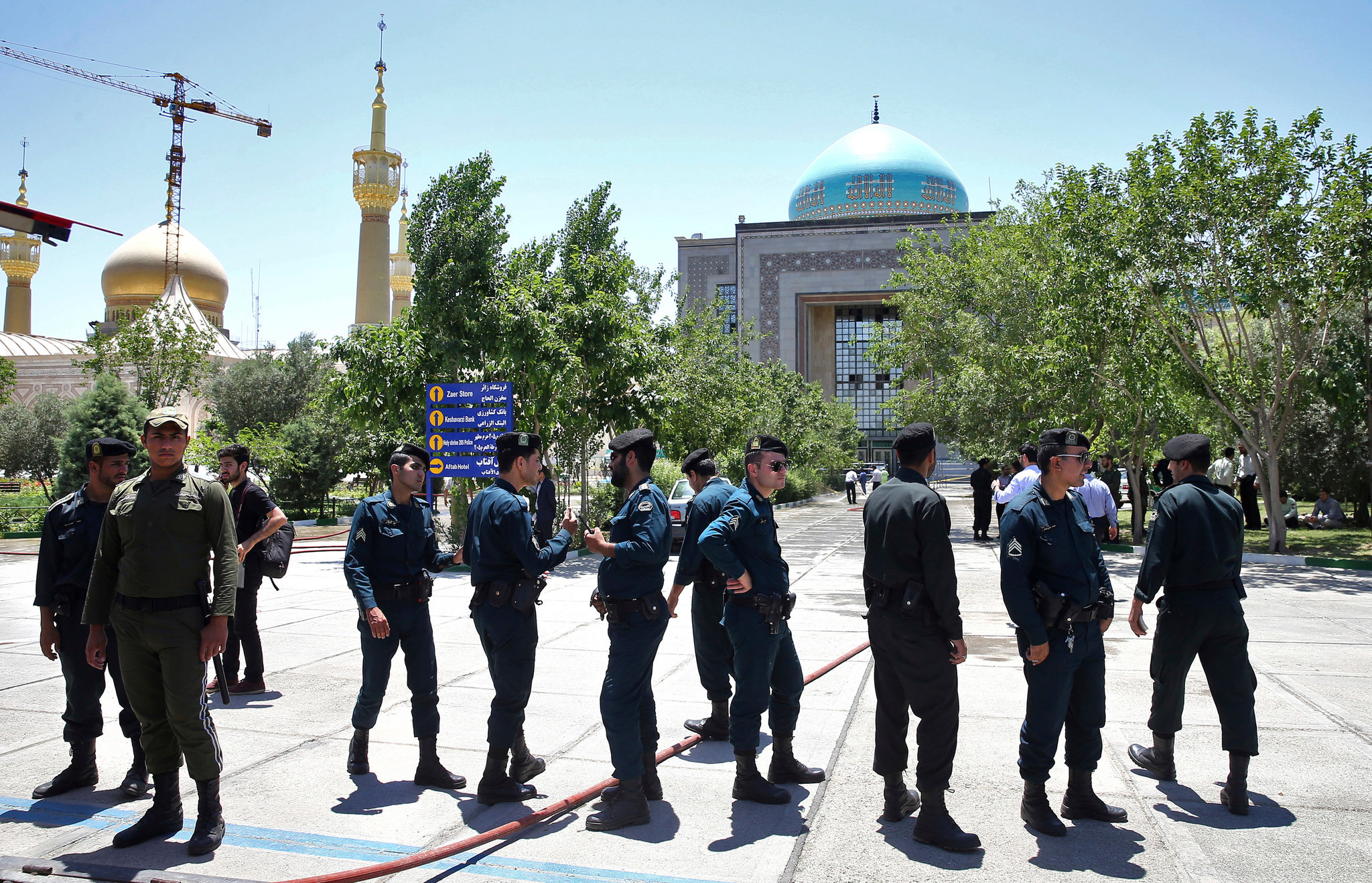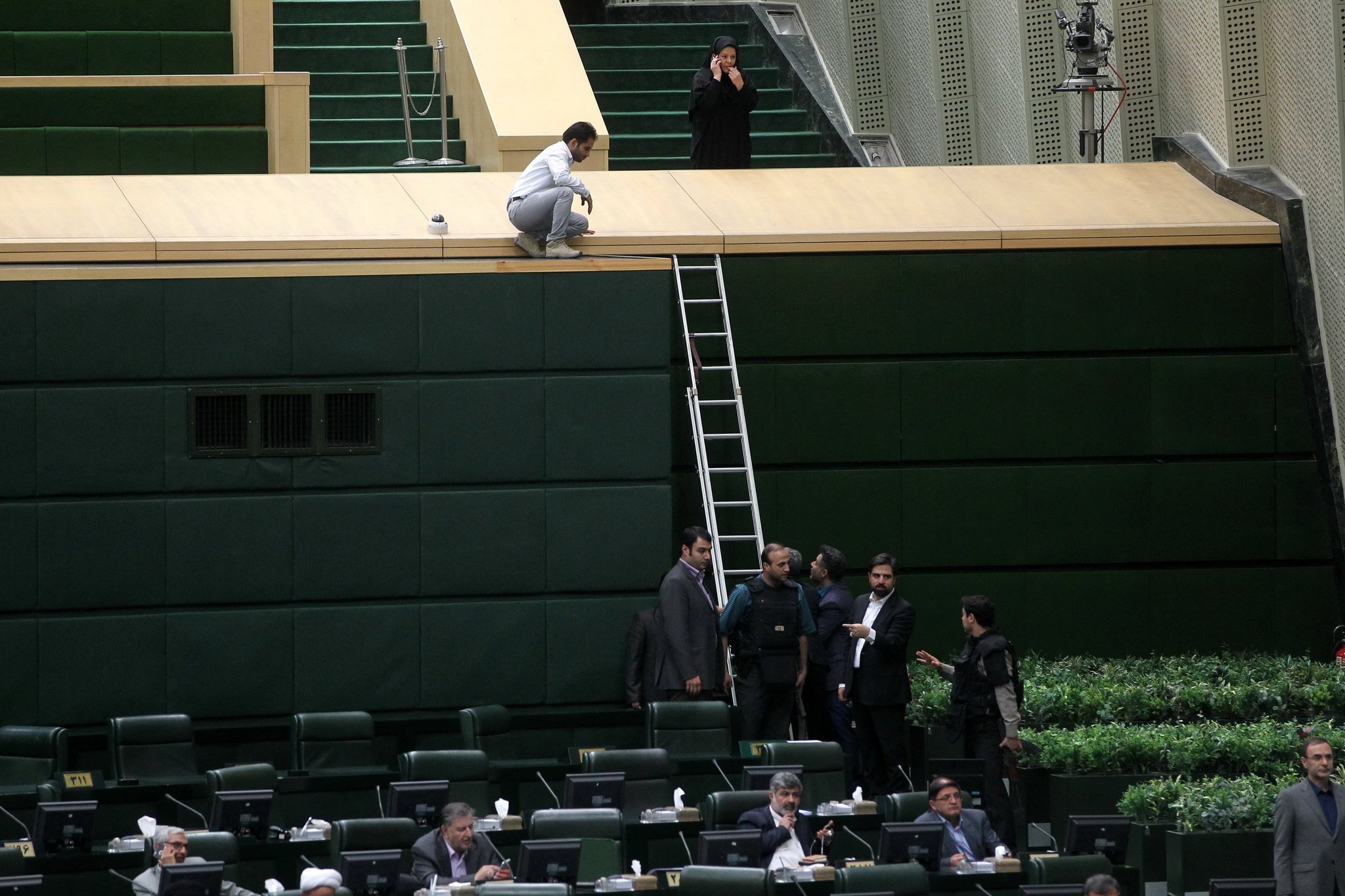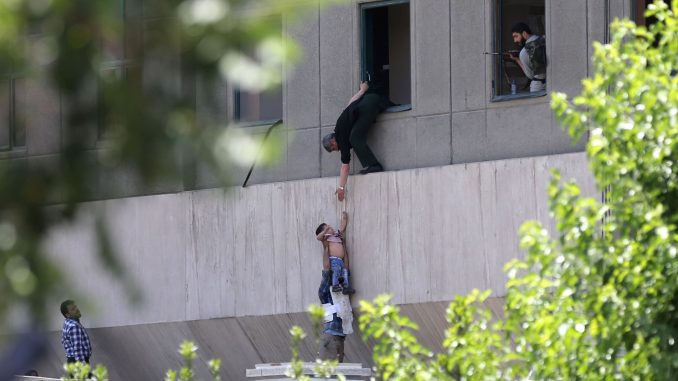
Iranians think ISIS inextricably linked to Saudi in Sunni Arab campaign to oppress Shiites all over Muslim world & limit Iran strategically. “Ideologically, financially and logistically, ISIS is fully supported and sponsored by Saudi Arabia – they are one and the same.” First terrorist attacks in more than a decade in Tehran come just over two weeks after Trump, with Saudi Arabia and its allies, vowed to isolate Iran. Iran dismissed those remarks, made at a summit meeting in Riyadh, the Saudi capital, as a scheme by Trump to sell weapons to Saudi Arabia. But Trumps’ threats suddenly became more menacing after the Saudis & their Sunni Arab Gulf allies unleashed a sudden political economic offensive against Qatar, the one Sunni Gulf state with extensive and positive relations with the “Persian devil.” The Tehran attacks came as Islamic State faces increasing pressure on the battlefield. The territory of Islamic State’s self-declared caliphate in Iraq and Syria is shrinking. US-backed forces in Syria began major operations on Monday to seize Raqqa, the Islamic State’s de facto capital. Here, Iranian police officers helping civilians leave the Parliament building in Tehran on Wednesday. Credit Omid Vahabzadeh, via Agence France-Presse — Getty Images
At least 12 people were killed and 42 others wounded Wednesday morning in a pair of devastating attacks on two of Iran’s most potent symbols:
the national Parliament and the mausoleum of the Islamic Republic’s founder, Ayatollah Ruhollah Khomeini.
The Islamic State immediately claimed responsibility;
if that is found to be true, the attacks would be the terrorist group’s first major assault within Iran’s borders.
Suspicions in Tehran were also directed at Saudi Arabia, Iran’s nemesis in the region,
which has been newly emboldened by a supportive visit from President Trump last month.
In the view of many in Iran, the Islamic State, also known as ISIS or ISIL, is inextricably linked to Saudi Arabia.
Hamidreza Taraghi, a hard-line analyst with ties to Iran’s supreme leader, Ayatollah Ali Khamenei, said,
“ISIS ideologically, financially and logistically is fully supported and sponsored by Saudi Arabia.”
“They are one and the same,” he added.
The attacks on Wednesday followed a familiar pattern of Islamic State assaults hitting more than one location.
Assailants armed with assault rifles and suicide vests descended on the Parliament and on the Khomeini mausoleum.
Six attackers were killed: four at the Parliament, and two at the mausoleum.
At Parliament, the assailants men
- entered the Parliament building in central Tehran,
- killed at least one security guard, and
- wounded and kidnapped other people,
the semiofficial news agency Fars reported.
The building has been undergoing renovations intended to enhance security, particularly at the entrance, but they have yet to be completed.
Scenes of Violence / Disorder / Chaos – Calling Cards of Sunni Political Islam
In a sign that elite security forces had encountered trouble containing the situation,
one attacker left the Parliament an hour into the siege,
then ran around shooting on Tehran’s streets before returning to the building —
where at least one of the assailants blew himself up on the fourth floor as others continued shooting from the windows.
“I cannot talk, I’m stuck here and the situation is really dangerous, the shooting is continuing, we are surrounded and I cannot talk,”
an Iranian journalist, Ehsan Bodaghi, said by phone from inside the Parliament building, before the call was disconnected.
Yelling and screaming could be heard in the background.
About the same time as the attack on Parliament, around 10 miles to the south,
two assailants entered the west wing of the sprawling Khomeini mausoleum,
a main destination for tourists and religious pilgrims.
According to local news agencies, at least one attacker detonated explosives in the western entrance.
Another was reported to have committed suicide by swallowing a cyanide pill.
Iran Politicians / Media Try To Play Down Extent & Importance Of Actions
Iranian state television broadcast news of the attack on Parliament after a regular report on a session in the building,
followed by an item on the increasing prices of kindergartens.
The body of a man suspected of having attacked the mausoleum of Ayatollah Ruhollah Khomeini in southern Tehran on Wednesday. Credit Ebrahim Noroozi/Associated Press
The speaker of Parliament, Ali Larijani, tried to play down the attacks as a “minor incident,”
saying that “some cowardly terrorists” had infiltrated the legislative complex and
vowing that “the security forces will definitely take serious measures against them.”
ISIS Not Leaving Any Doubt They Are Responsible – & Linked To Saudis
The Islamic State released a graphic video showing a bloodied man lying on the ground in the Parliament while a gunman in the background shouted,
“Thank God! Do you think that we are going to leave? We will remain here, God willing.”
The first terrorist attacks in more than a decade in Tehran come just over two weeks after Trump, with Saudi Arabia and its allies, vowed to isolate Iran.
Iran has dismissed those remarks, made at a summit meeting in Riyadh, the Saudi capital, as a scheme by Trump to sell weapons to Saudi Arabia.
The Iranian foreign minister, Mohammad Javad Zarif, has even suggested that Trump was “milking” Saudi Arabia.
Sectarian Polarization Now Echoed By Geo-Political Strategic Rivalry
Iran and Saudi Arabia are the leading nations on the opposing sides of the Middle East split between Shiite and Sunni Islam.
Iran has military advisers in Iraq and Syria, and it controls and finances militias in those countries and in Lebanon.
Tehran also has some influence over the Houthis fighting the government in Yemen,
and it often speaks out in support of Shiites in Bahrain, a majority group that Iran says is repressed by the Sunni monarchy.
Saudi Arabia recently raised the volume of criticism against Iran,
and the country led a regional effort on Monday to isolate Qatar —
the one Gulf Arab country that maintains relations with Tehran.
Iranian security forces outside the Parliament building on Wednesday. Credit Tima, via Reuters
Iran has long accused Saudi Arabia of supporting terrorists in the region,
saying the kingdom had facilitated the rise of Sunni extremist groups such as the Islamic State and others in Iraq and Syria.
After Egypt, Saudi Arabia, the United Arab Emirates and other states cut ties with the gas-rich kingdom of Qatar, citing its support for Iran,
Tehran rushed to fill the void, offering to ship food and medicine to Qatar.
“The Saudis feel empowered now,” said Taraghi, the hard-line analyst.
“They are now taking revenge in Tehran,’’ he said,
adding that Iran’s policy was to drive a wedge between those in the Saudi alliance.
“We are now helping Qatar,” he said.
“This Saudi alliance means nothing.”
One Iranian security official said the attacks had been a message from Saudi Arabia that was meant to teach Iran a lesson.
He also said the assaults were intended to test Iran’s reaction.
Others questioned Tehran’s decision to rise to the defense of Qatar.
“We are wrong to suddenly seek close ties with Qatar,” said Saeed Laylaz, an economist close to the government.
“They have been bankrolling the Sunni terrorist groups, in the same way the Saudis have.”
Security personnel outside the Khomeini mausoleum after the attacks on Wednesday. Credit Ebrahim Noroozi/Associated Press
Sunni Leaders Find It Hard To Conceal Their Concern Over Iran Democracy
King Salman of Saudi Arabia accuses Iran of “spearheading global terrorism.”
Saudi officials say Iran is plotting to control the region.
Saudi Arabia, an autocratic kingdom, also opposes Iran’s political ideology, which has a clerical supreme leader
but also a president, Parliament and City Councils, chosen in elections where men and women can participate.
While terrorist attacks have become relatively commonplace in Europe and in most of the Middle East,
Iran had remained comparatively safe.
During May’s election campaign, President Hassan Rouhani often pointed to that fact,
lauding the country’s security forces and intelligence agencies for their vigilance.
The coordinated terrorist attacks on Wednesday brought such feelings of security to an end, one analyst said.
“Today, it was proved that we are vulnerable too,” the analyst, Nader Karimi Joni, said.
“We must anticipate more attacks by the Islamic State, now that we are defeating them in Iraq and Syria,” he added.
While most details of the attacks on Wednesday remained unclear, local news agencies reported that
one assailant at the mausoleum was a woman, who blew herself up, while another took cyanide and died.
Mujahedeen Khalq
For many years, Iran suffered from a long and bitter campaign of terrorist attacks by an armed opposition group,
Mujahedeen Khalq, a Marxist-Islamic organization that for decades was supported by the former Iraqi dictator, Saddam Hussein.
In many of Mujahedeen Khalq’s attacks, its members would take cyanide when cornered.
In 2012, the group was taken OFF the United States’ list of terrorist organizations —
with the support of conservative Republican politicians.
Police officers were deployed inside the Parliament hall to protect lawmakers. Credit Chavosh Homavandi/European Pressphoto Agency
ISIS Successful in Random Terror Attacks – Less So Establishing Stable Territory
The attacks in Iran came as the Islamic State faces increasing pressure on the battlefield.
The territory of the Islamic State’s self-declared caliphate in Iraq and Syria is shrinking.
American-backed forces in Syria began major operations on Monday to seize Raqqa, the Islamic State’s de facto capital.
Many Islamic State fighters have been decamping to the Syrian city of Mayadeen further south.
In Iraq, fierce fighting is underway for the city of Mosul, with Iranian-backed militias and American warplanes aiding the Iraqi military.
A common Islamic State tactic, when it loses territory, is to create a distraction and to try to bolster morale among its followers by staging attacks abroad.
The suicide bombing in Manchester, England, on May 22, and the terrorist attack on London on Saturday night fit that pattern.
Mokhtar Awad, a research fellow in the Program on Extremism at George Washington University, said
the attacks in Tehran were an attempt by the Islamic State to finally address “one of the biggest talking points used against it in jihadi circles”:
its perceived inability to attack Iran.
“They have been ridiculed for this for a long time,” Awad said.
“This is going to help them reach out to a broader population of Salafis and jihadis
who will now see that the Islamic State is genuinely fighting all the enemies of Islam.”
“This is a powerful counter message,” he added, referring to the attacks.
“Now they have shown that they are more than capable of taking the fight to Tehran.”
Awad also said that the attack could have been partly motivated by the Islamic State’s desire to claim victory somewhere new
to raise morale after the blows that have been dealt to their bases in Iraq, Libya and Syria.
While the attacks may be the Islamic State’s first successful assault on Iran,
they were not the first time that the group had targeted the country.
“Several attempts have taken place since 2015,” Jean-Charles Brisard, chairman of the Paris-based Center for the Analysis of Terrorism, said.
“The attacks follow several calls from ISIS to target Iran, the latest being in March
when ISIS jihadists speaking in Farsi called in a video for Iranian Sunnis to target Iran,” he added.
———————————
Source: Islamic State Claims Deadly Iran Attacks on Parliament and Khomeini Tomb – The New York Times
